E-Commerce Law Assignment - [University Name], [Semester]
VerifiedAdded on 2022/09/16
|8
|1733
|165
Homework Assignment
AI Summary
This assignment provides a comprehensive overview of e-commerce law in Saudi Arabia, addressing key questions related to online business operations and intellectual property. It begins by outlining the initial steps for establishing an online business, including choosing a business name, registering a domain, obtaining commercial registration, and navigating payment processing. The assignment then delves into the specifics of the Saudi Arabian E-Commerce Law, including its impact on service providers and customers. It also examines the legal framework governing trademarks, including the Gulf Cooperation Council Trademark Law, and details the process for trademark registration, the duration of trademark protection, and the responsible authorities in case of disputes. The assignment emphasizes the importance of adhering to legal requirements to ensure compliance and protect intellectual property within the e-commerce landscape of Saudi Arabia.
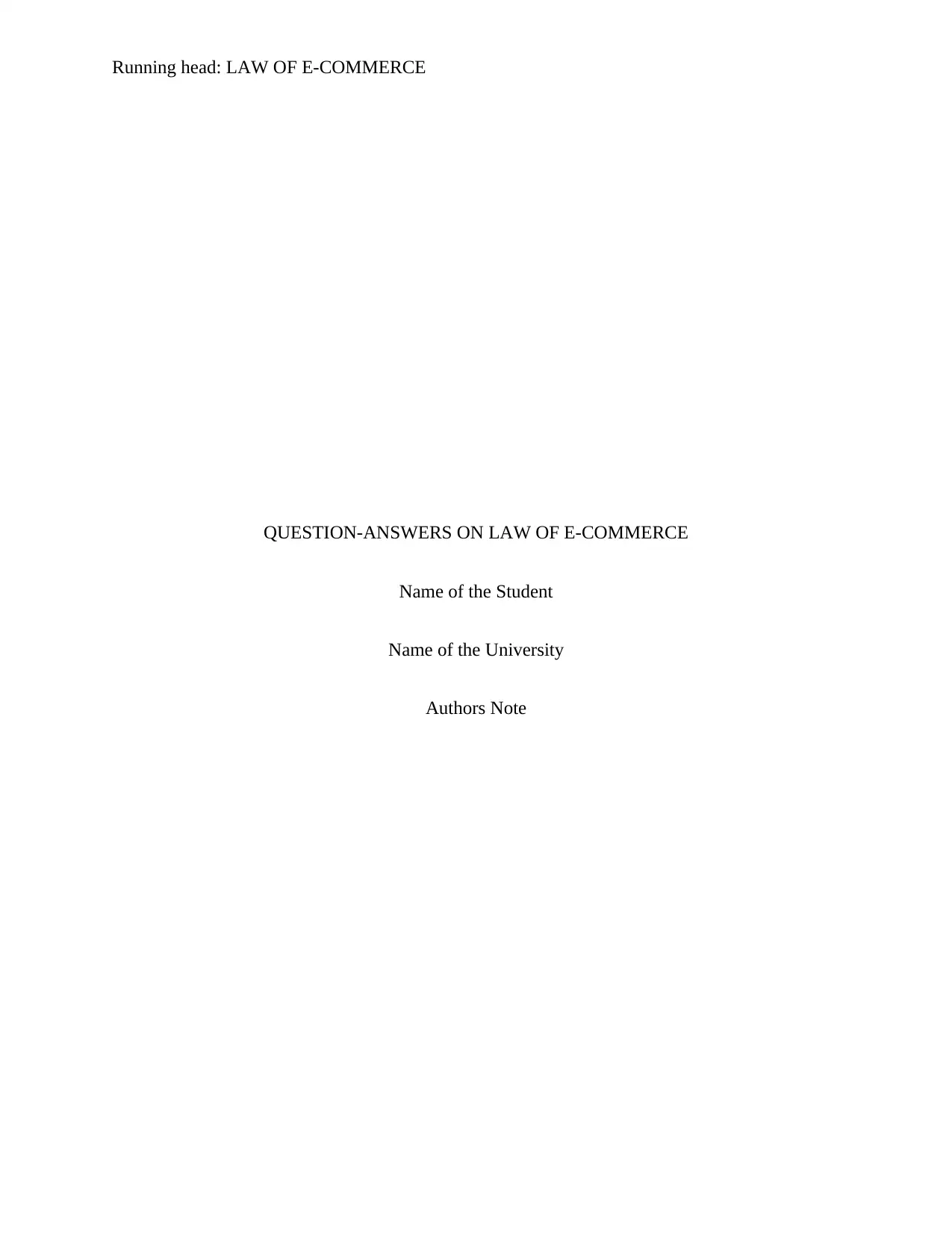
Running head: LAW OF E-COMMERCE
QUESTION-ANSWERS ON LAW OF E-COMMERCE
Name of the Student
Name of the University
Authors Note
QUESTION-ANSWERS ON LAW OF E-COMMERCE
Name of the Student
Name of the University
Authors Note
Paraphrase This Document
Need a fresh take? Get an instant paraphrase of this document with our AI Paraphraser
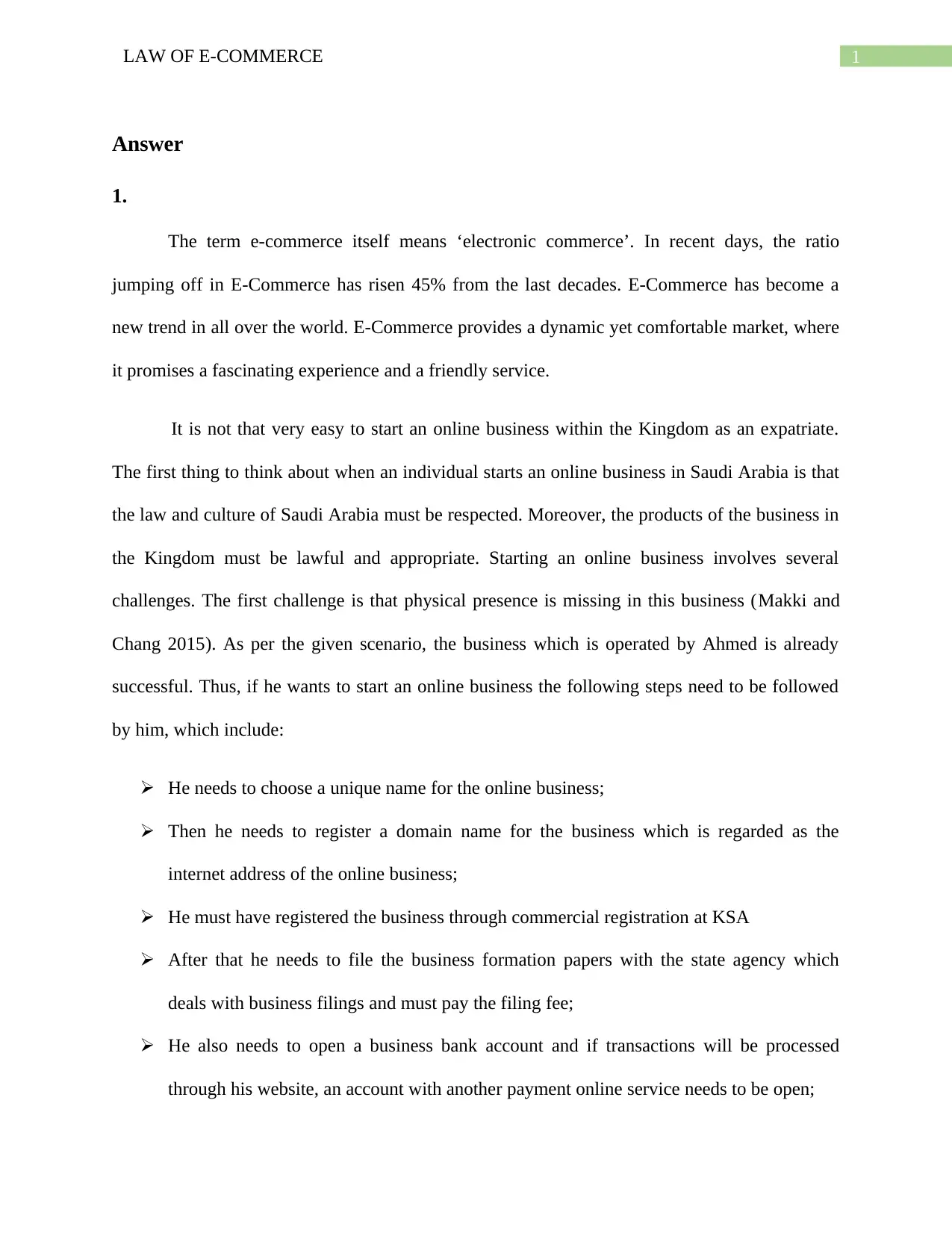
1LAW OF E-COMMERCE
Answer
1.
The term e-commerce itself means ‘electronic commerce’. In recent days, the ratio
jumping off in E-Commerce has risen 45% from the last decades. E-Commerce has become a
new trend in all over the world. E-Commerce provides a dynamic yet comfortable market, where
it promises a fascinating experience and a friendly service.
It is not that very easy to start an online business within the Kingdom as an expatriate.
The first thing to think about when an individual starts an online business in Saudi Arabia is that
the law and culture of Saudi Arabia must be respected. Moreover, the products of the business in
the Kingdom must be lawful and appropriate. Starting an online business involves several
challenges. The first challenge is that physical presence is missing in this business (Makki and
Chang 2015). As per the given scenario, the business which is operated by Ahmed is already
successful. Thus, if he wants to start an online business the following steps need to be followed
by him, which include:
He needs to choose a unique name for the online business;
Then he needs to register a domain name for the business which is regarded as the
internet address of the online business;
He must have registered the business through commercial registration at KSA
After that he needs to file the business formation papers with the state agency which
deals with business filings and must pay the filing fee;
He also needs to open a business bank account and if transactions will be processed
through his website, an account with another payment online service needs to be open;
Answer
1.
The term e-commerce itself means ‘electronic commerce’. In recent days, the ratio
jumping off in E-Commerce has risen 45% from the last decades. E-Commerce has become a
new trend in all over the world. E-Commerce provides a dynamic yet comfortable market, where
it promises a fascinating experience and a friendly service.
It is not that very easy to start an online business within the Kingdom as an expatriate.
The first thing to think about when an individual starts an online business in Saudi Arabia is that
the law and culture of Saudi Arabia must be respected. Moreover, the products of the business in
the Kingdom must be lawful and appropriate. Starting an online business involves several
challenges. The first challenge is that physical presence is missing in this business (Makki and
Chang 2015). As per the given scenario, the business which is operated by Ahmed is already
successful. Thus, if he wants to start an online business the following steps need to be followed
by him, which include:
He needs to choose a unique name for the online business;
Then he needs to register a domain name for the business which is regarded as the
internet address of the online business;
He must have registered the business through commercial registration at KSA
After that he needs to file the business formation papers with the state agency which
deals with business filings and must pay the filing fee;
He also needs to open a business bank account and if transactions will be processed
through his website, an account with another payment online service needs to be open;
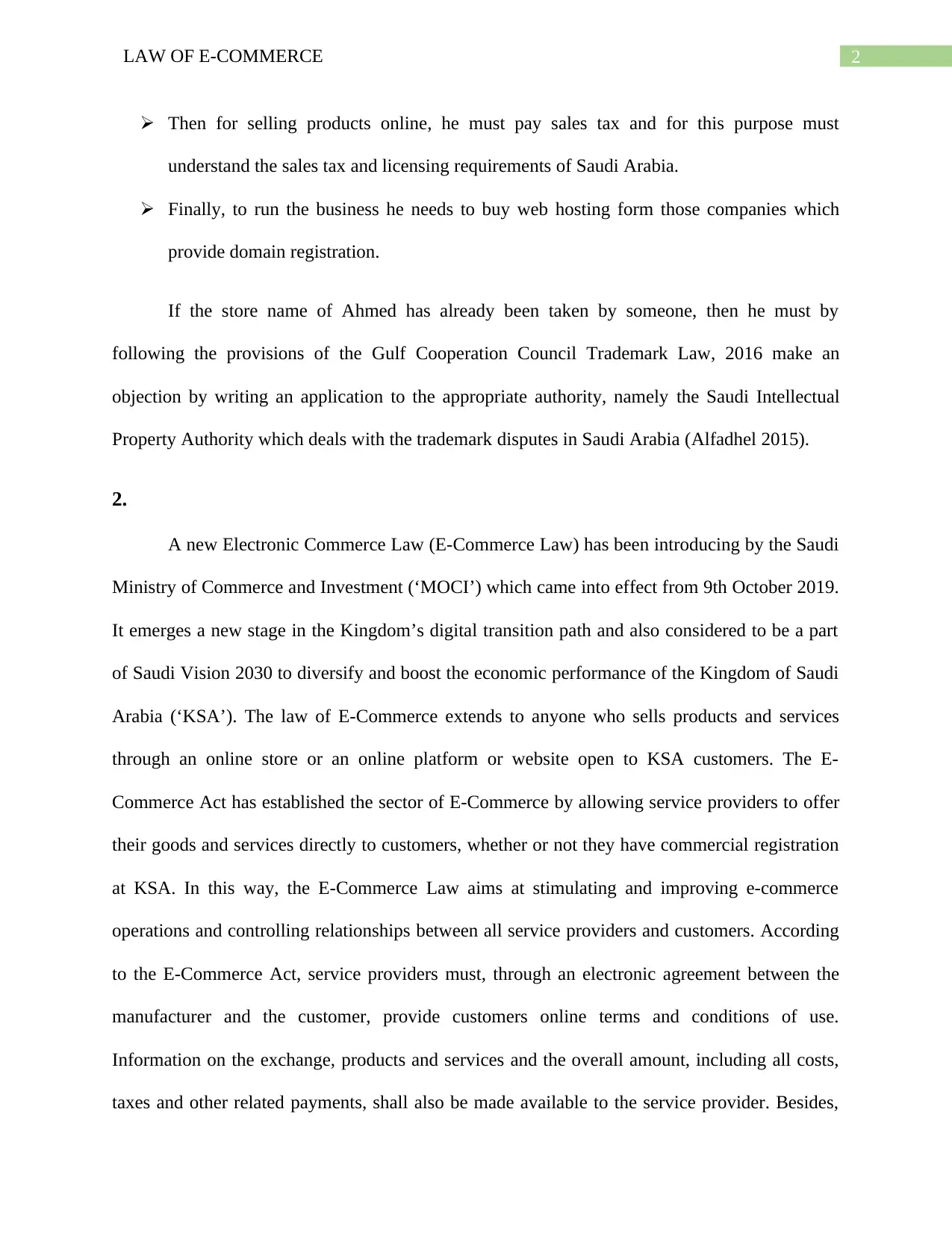
2LAW OF E-COMMERCE
Then for selling products online, he must pay sales tax and for this purpose must
understand the sales tax and licensing requirements of Saudi Arabia.
Finally, to run the business he needs to buy web hosting form those companies which
provide domain registration.
If the store name of Ahmed has already been taken by someone, then he must by
following the provisions of the Gulf Cooperation Council Trademark Law, 2016 make an
objection by writing an application to the appropriate authority, namely the Saudi Intellectual
Property Authority which deals with the trademark disputes in Saudi Arabia (Alfadhel 2015).
2.
A new Electronic Commerce Law (E-Commerce Law) has been introducing by the Saudi
Ministry of Commerce and Investment (‘MOCI’) which came into effect from 9th October 2019.
It emerges a new stage in the Kingdom’s digital transition path and also considered to be a part
of Saudi Vision 2030 to diversify and boost the economic performance of the Kingdom of Saudi
Arabia (‘KSA’). The law of E-Commerce extends to anyone who sells products and services
through an online store or an online platform or website open to KSA customers. The E-
Commerce Act has established the sector of E-Commerce by allowing service providers to offer
their goods and services directly to customers, whether or not they have commercial registration
at KSA. In this way, the E-Commerce Law aims at stimulating and improving e-commerce
operations and controlling relationships between all service providers and customers. According
to the E-Commerce Act, service providers must, through an electronic agreement between the
manufacturer and the customer, provide customers online terms and conditions of use.
Information on the exchange, products and services and the overall amount, including all costs,
taxes and other related payments, shall also be made available to the service provider. Besides,
Then for selling products online, he must pay sales tax and for this purpose must
understand the sales tax and licensing requirements of Saudi Arabia.
Finally, to run the business he needs to buy web hosting form those companies which
provide domain registration.
If the store name of Ahmed has already been taken by someone, then he must by
following the provisions of the Gulf Cooperation Council Trademark Law, 2016 make an
objection by writing an application to the appropriate authority, namely the Saudi Intellectual
Property Authority which deals with the trademark disputes in Saudi Arabia (Alfadhel 2015).
2.
A new Electronic Commerce Law (E-Commerce Law) has been introducing by the Saudi
Ministry of Commerce and Investment (‘MOCI’) which came into effect from 9th October 2019.
It emerges a new stage in the Kingdom’s digital transition path and also considered to be a part
of Saudi Vision 2030 to diversify and boost the economic performance of the Kingdom of Saudi
Arabia (‘KSA’). The law of E-Commerce extends to anyone who sells products and services
through an online store or an online platform or website open to KSA customers. The E-
Commerce Act has established the sector of E-Commerce by allowing service providers to offer
their goods and services directly to customers, whether or not they have commercial registration
at KSA. In this way, the E-Commerce Law aims at stimulating and improving e-commerce
operations and controlling relationships between all service providers and customers. According
to the E-Commerce Act, service providers must, through an electronic agreement between the
manufacturer and the customer, provide customers online terms and conditions of use.
Information on the exchange, products and services and the overall amount, including all costs,
taxes and other related payments, shall also be made available to the service provider. Besides,
⊘ This is a preview!⊘
Do you want full access?
Subscribe today to unlock all pages.

Trusted by 1+ million students worldwide
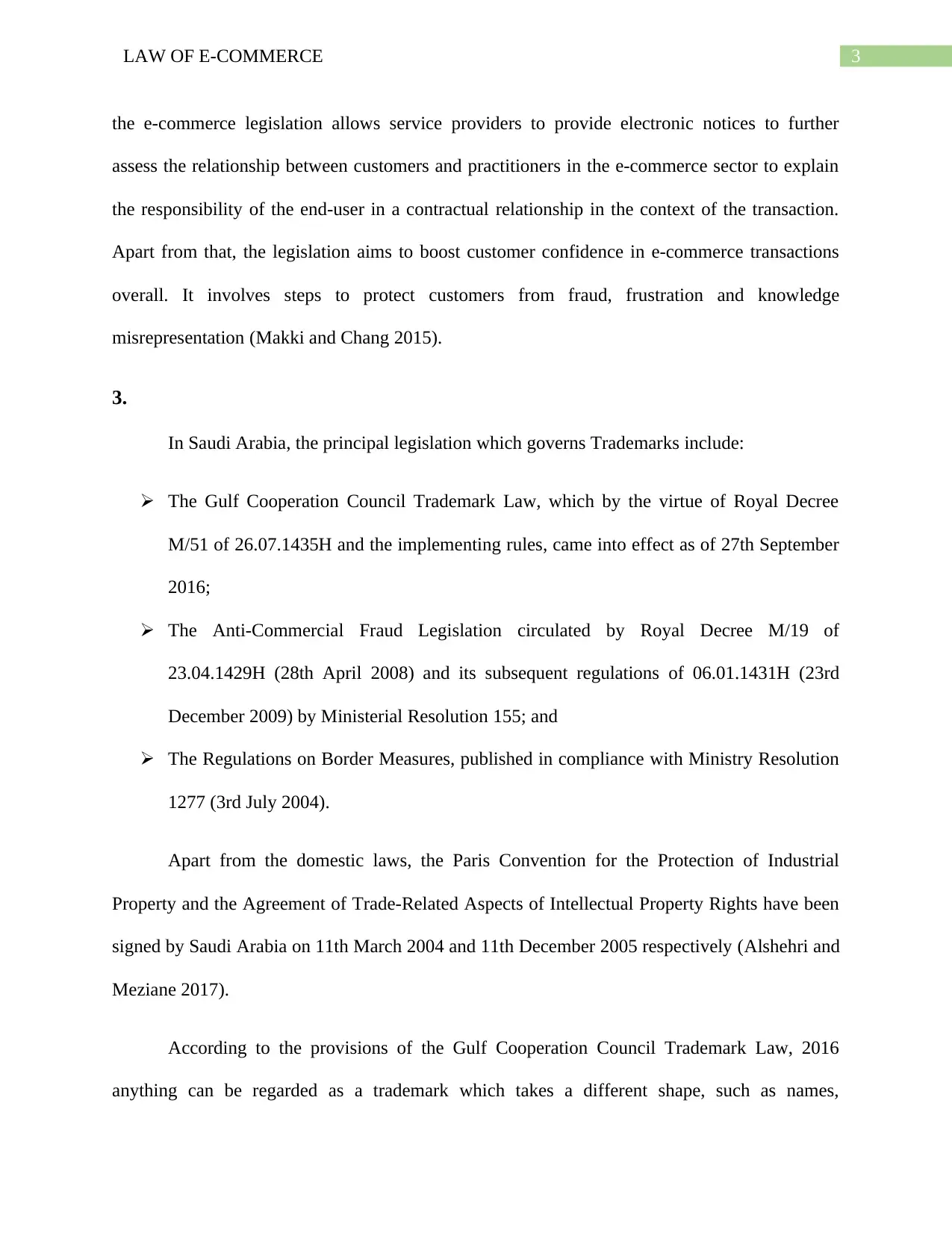
3LAW OF E-COMMERCE
the e-commerce legislation allows service providers to provide electronic notices to further
assess the relationship between customers and practitioners in the e-commerce sector to explain
the responsibility of the end-user in a contractual relationship in the context of the transaction.
Apart from that, the legislation aims to boost customer confidence in e-commerce transactions
overall. It involves steps to protect customers from fraud, frustration and knowledge
misrepresentation (Makki and Chang 2015).
3.
In Saudi Arabia, the principal legislation which governs Trademarks include:
The Gulf Cooperation Council Trademark Law, which by the virtue of Royal Decree
M/51 of 26.07.1435H and the implementing rules, came into effect as of 27th September
2016;
The Anti-Commercial Fraud Legislation circulated by Royal Decree M/19 of
23.04.1429H (28th April 2008) and its subsequent regulations of 06.01.1431H (23rd
December 2009) by Ministerial Resolution 155; and
The Regulations on Border Measures, published in compliance with Ministry Resolution
1277 (3rd July 2004).
Apart from the domestic laws, the Paris Convention for the Protection of Industrial
Property and the Agreement of Trade-Related Aspects of Intellectual Property Rights have been
signed by Saudi Arabia on 11th March 2004 and 11th December 2005 respectively (Alshehri and
Meziane 2017).
According to the provisions of the Gulf Cooperation Council Trademark Law, 2016
anything can be regarded as a trademark which takes a different shape, such as names,
the e-commerce legislation allows service providers to provide electronic notices to further
assess the relationship between customers and practitioners in the e-commerce sector to explain
the responsibility of the end-user in a contractual relationship in the context of the transaction.
Apart from that, the legislation aims to boost customer confidence in e-commerce transactions
overall. It involves steps to protect customers from fraud, frustration and knowledge
misrepresentation (Makki and Chang 2015).
3.
In Saudi Arabia, the principal legislation which governs Trademarks include:
The Gulf Cooperation Council Trademark Law, which by the virtue of Royal Decree
M/51 of 26.07.1435H and the implementing rules, came into effect as of 27th September
2016;
The Anti-Commercial Fraud Legislation circulated by Royal Decree M/19 of
23.04.1429H (28th April 2008) and its subsequent regulations of 06.01.1431H (23rd
December 2009) by Ministerial Resolution 155; and
The Regulations on Border Measures, published in compliance with Ministry Resolution
1277 (3rd July 2004).
Apart from the domestic laws, the Paris Convention for the Protection of Industrial
Property and the Agreement of Trade-Related Aspects of Intellectual Property Rights have been
signed by Saudi Arabia on 11th March 2004 and 11th December 2005 respectively (Alshehri and
Meziane 2017).
According to the provisions of the Gulf Cooperation Council Trademark Law, 2016
anything can be regarded as a trademark which takes a different shape, such as names,
Paraphrase This Document
Need a fresh take? Get an instant paraphrase of this document with our AI Paraphraser
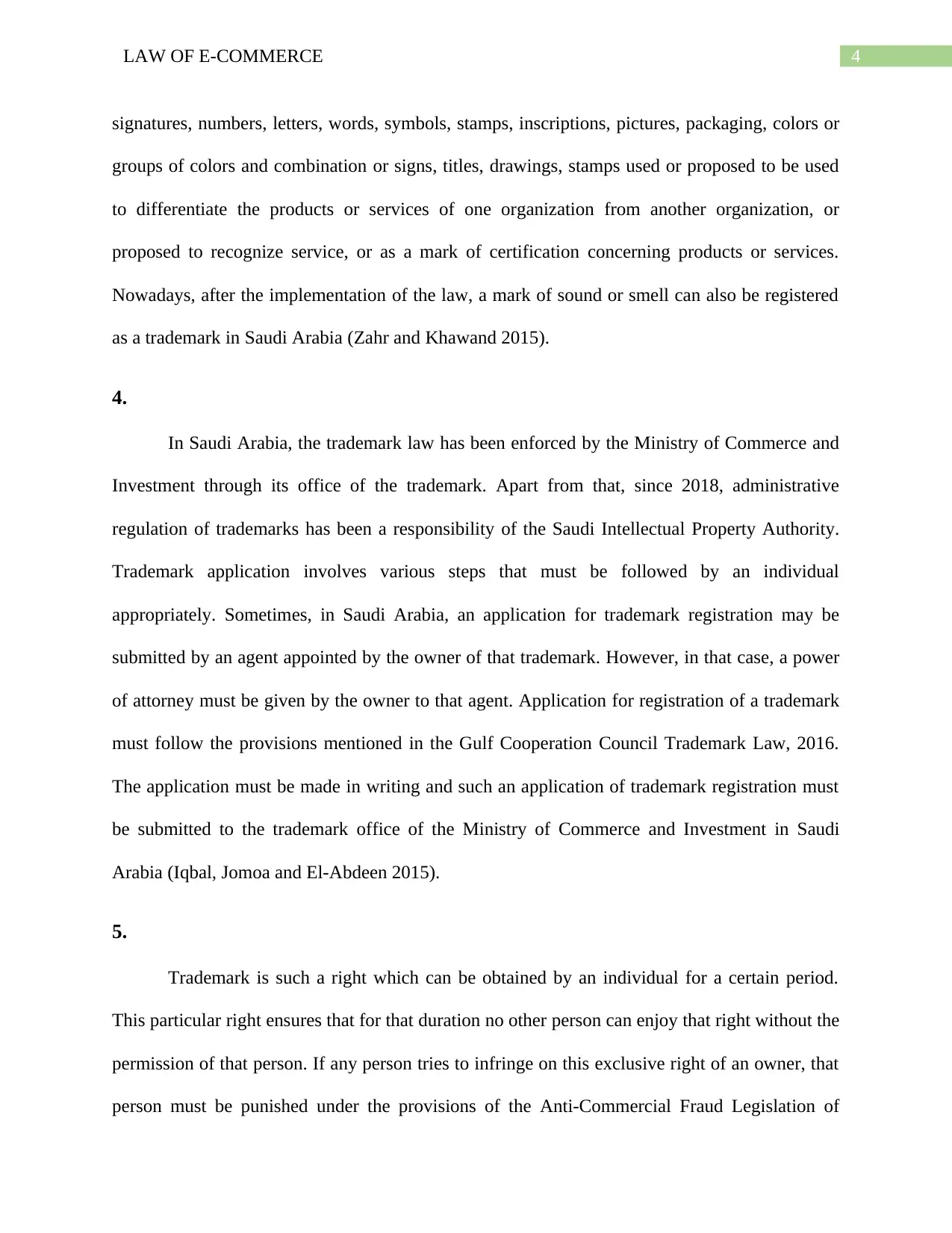
4LAW OF E-COMMERCE
signatures, numbers, letters, words, symbols, stamps, inscriptions, pictures, packaging, colors or
groups of colors and combination or signs, titles, drawings, stamps used or proposed to be used
to differentiate the products or services of one organization from another organization, or
proposed to recognize service, or as a mark of certification concerning products or services.
Nowadays, after the implementation of the law, a mark of sound or smell can also be registered
as a trademark in Saudi Arabia (Zahr and Khawand 2015).
4.
In Saudi Arabia, the trademark law has been enforced by the Ministry of Commerce and
Investment through its office of the trademark. Apart from that, since 2018, administrative
regulation of trademarks has been a responsibility of the Saudi Intellectual Property Authority.
Trademark application involves various steps that must be followed by an individual
appropriately. Sometimes, in Saudi Arabia, an application for trademark registration may be
submitted by an agent appointed by the owner of that trademark. However, in that case, a power
of attorney must be given by the owner to that agent. Application for registration of a trademark
must follow the provisions mentioned in the Gulf Cooperation Council Trademark Law, 2016.
The application must be made in writing and such an application of trademark registration must
be submitted to the trademark office of the Ministry of Commerce and Investment in Saudi
Arabia (Iqbal, Jomoa and El-Abdeen 2015).
5.
Trademark is such a right which can be obtained by an individual for a certain period.
This particular right ensures that for that duration no other person can enjoy that right without the
permission of that person. If any person tries to infringe on this exclusive right of an owner, that
person must be punished under the provisions of the Anti-Commercial Fraud Legislation of
signatures, numbers, letters, words, symbols, stamps, inscriptions, pictures, packaging, colors or
groups of colors and combination or signs, titles, drawings, stamps used or proposed to be used
to differentiate the products or services of one organization from another organization, or
proposed to recognize service, or as a mark of certification concerning products or services.
Nowadays, after the implementation of the law, a mark of sound or smell can also be registered
as a trademark in Saudi Arabia (Zahr and Khawand 2015).
4.
In Saudi Arabia, the trademark law has been enforced by the Ministry of Commerce and
Investment through its office of the trademark. Apart from that, since 2018, administrative
regulation of trademarks has been a responsibility of the Saudi Intellectual Property Authority.
Trademark application involves various steps that must be followed by an individual
appropriately. Sometimes, in Saudi Arabia, an application for trademark registration may be
submitted by an agent appointed by the owner of that trademark. However, in that case, a power
of attorney must be given by the owner to that agent. Application for registration of a trademark
must follow the provisions mentioned in the Gulf Cooperation Council Trademark Law, 2016.
The application must be made in writing and such an application of trademark registration must
be submitted to the trademark office of the Ministry of Commerce and Investment in Saudi
Arabia (Iqbal, Jomoa and El-Abdeen 2015).
5.
Trademark is such a right which can be obtained by an individual for a certain period.
This particular right ensures that for that duration no other person can enjoy that right without the
permission of that person. If any person tries to infringe on this exclusive right of an owner, that
person must be punished under the provisions of the Anti-Commercial Fraud Legislation of
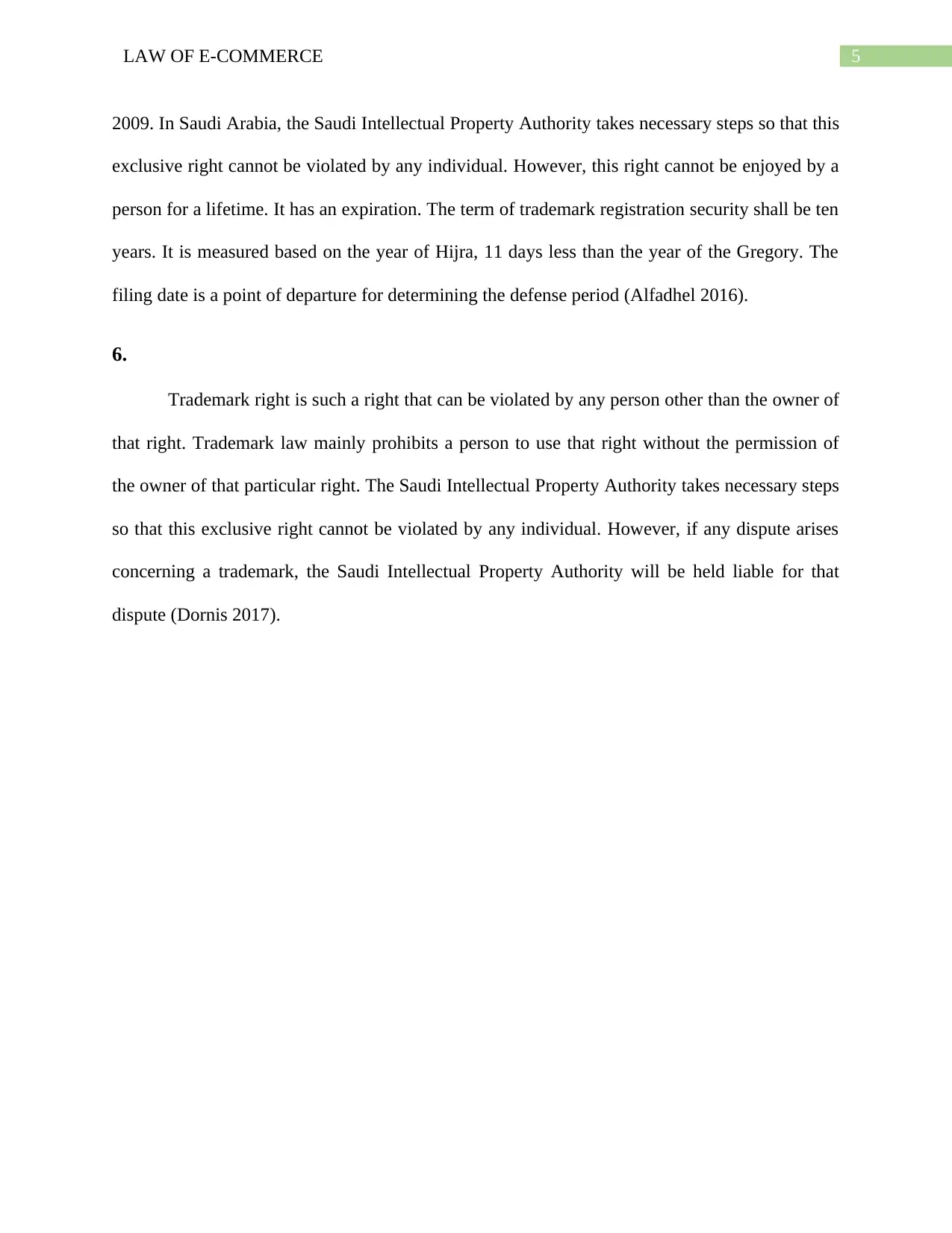
5LAW OF E-COMMERCE
2009. In Saudi Arabia, the Saudi Intellectual Property Authority takes necessary steps so that this
exclusive right cannot be violated by any individual. However, this right cannot be enjoyed by a
person for a lifetime. It has an expiration. The term of trademark registration security shall be ten
years. It is measured based on the year of Hijra, 11 days less than the year of the Gregory. The
filing date is a point of departure for determining the defense period (Alfadhel 2016).
6.
Trademark right is such a right that can be violated by any person other than the owner of
that right. Trademark law mainly prohibits a person to use that right without the permission of
the owner of that particular right. The Saudi Intellectual Property Authority takes necessary steps
so that this exclusive right cannot be violated by any individual. However, if any dispute arises
concerning a trademark, the Saudi Intellectual Property Authority will be held liable for that
dispute (Dornis 2017).
2009. In Saudi Arabia, the Saudi Intellectual Property Authority takes necessary steps so that this
exclusive right cannot be violated by any individual. However, this right cannot be enjoyed by a
person for a lifetime. It has an expiration. The term of trademark registration security shall be ten
years. It is measured based on the year of Hijra, 11 days less than the year of the Gregory. The
filing date is a point of departure for determining the defense period (Alfadhel 2016).
6.
Trademark right is such a right that can be violated by any person other than the owner of
that right. Trademark law mainly prohibits a person to use that right without the permission of
the owner of that particular right. The Saudi Intellectual Property Authority takes necessary steps
so that this exclusive right cannot be violated by any individual. However, if any dispute arises
concerning a trademark, the Saudi Intellectual Property Authority will be held liable for that
dispute (Dornis 2017).
⊘ This is a preview!⊘
Do you want full access?
Subscribe today to unlock all pages.

Trusted by 1+ million students worldwide
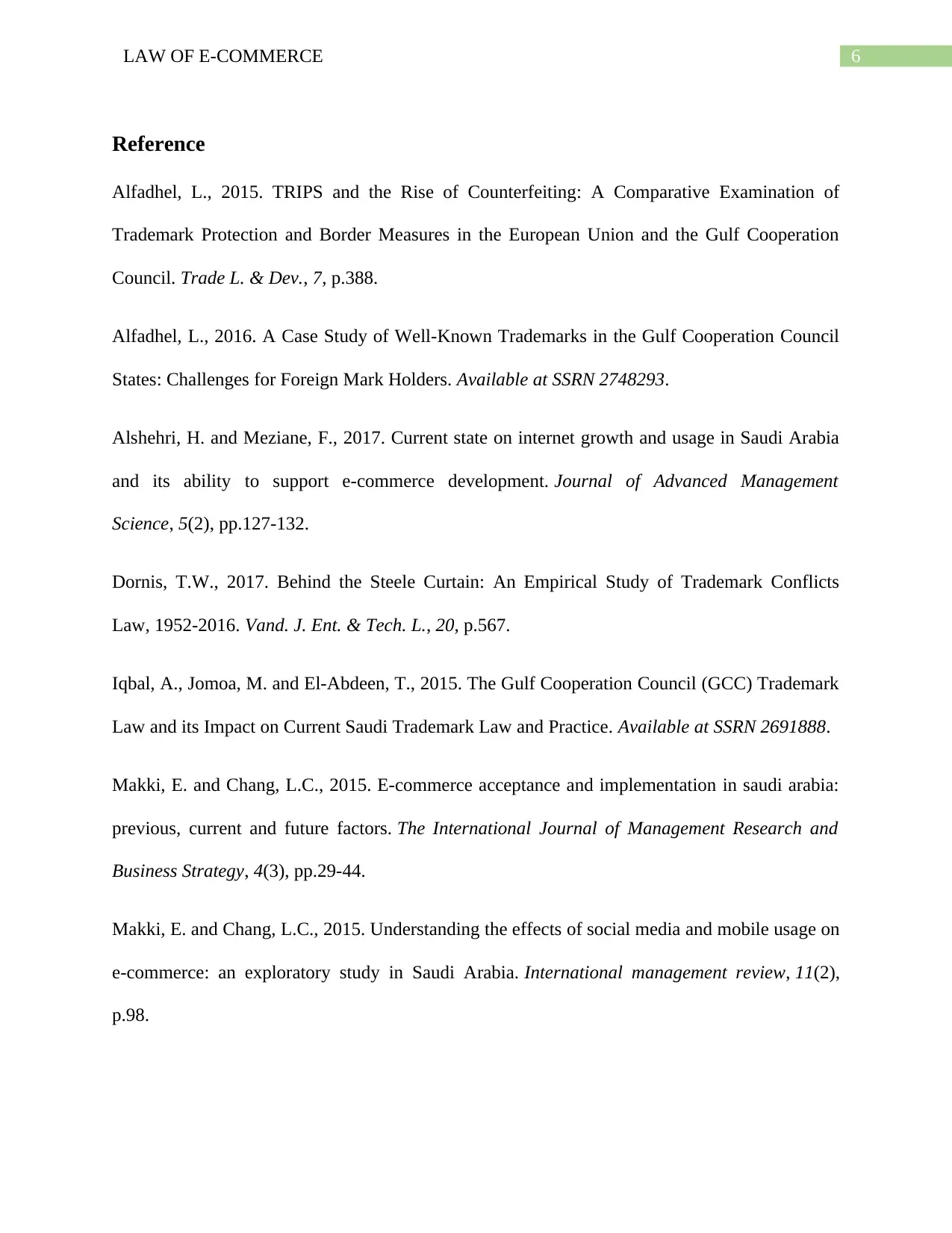
6LAW OF E-COMMERCE
Reference
Alfadhel, L., 2015. TRIPS and the Rise of Counterfeiting: A Comparative Examination of
Trademark Protection and Border Measures in the European Union and the Gulf Cooperation
Council. Trade L. & Dev., 7, p.388.
Alfadhel, L., 2016. A Case Study of Well-Known Trademarks in the Gulf Cooperation Council
States: Challenges for Foreign Mark Holders. Available at SSRN 2748293.
Alshehri, H. and Meziane, F., 2017. Current state on internet growth and usage in Saudi Arabia
and its ability to support e-commerce development. Journal of Advanced Management
Science, 5(2), pp.127-132.
Dornis, T.W., 2017. Behind the Steele Curtain: An Empirical Study of Trademark Conflicts
Law, 1952-2016. Vand. J. Ent. & Tech. L., 20, p.567.
Iqbal, A., Jomoa, M. and El-Abdeen, T., 2015. The Gulf Cooperation Council (GCC) Trademark
Law and its Impact on Current Saudi Trademark Law and Practice. Available at SSRN 2691888.
Makki, E. and Chang, L.C., 2015. E-commerce acceptance and implementation in saudi arabia:
previous, current and future factors. The International Journal of Management Research and
Business Strategy, 4(3), pp.29-44.
Makki, E. and Chang, L.C., 2015. Understanding the effects of social media and mobile usage on
e-commerce: an exploratory study in Saudi Arabia. International management review, 11(2),
p.98.
Reference
Alfadhel, L., 2015. TRIPS and the Rise of Counterfeiting: A Comparative Examination of
Trademark Protection and Border Measures in the European Union and the Gulf Cooperation
Council. Trade L. & Dev., 7, p.388.
Alfadhel, L., 2016. A Case Study of Well-Known Trademarks in the Gulf Cooperation Council
States: Challenges for Foreign Mark Holders. Available at SSRN 2748293.
Alshehri, H. and Meziane, F., 2017. Current state on internet growth and usage in Saudi Arabia
and its ability to support e-commerce development. Journal of Advanced Management
Science, 5(2), pp.127-132.
Dornis, T.W., 2017. Behind the Steele Curtain: An Empirical Study of Trademark Conflicts
Law, 1952-2016. Vand. J. Ent. & Tech. L., 20, p.567.
Iqbal, A., Jomoa, M. and El-Abdeen, T., 2015. The Gulf Cooperation Council (GCC) Trademark
Law and its Impact on Current Saudi Trademark Law and Practice. Available at SSRN 2691888.
Makki, E. and Chang, L.C., 2015. E-commerce acceptance and implementation in saudi arabia:
previous, current and future factors. The International Journal of Management Research and
Business Strategy, 4(3), pp.29-44.
Makki, E. and Chang, L.C., 2015. Understanding the effects of social media and mobile usage on
e-commerce: an exploratory study in Saudi Arabia. International management review, 11(2),
p.98.
Paraphrase This Document
Need a fresh take? Get an instant paraphrase of this document with our AI Paraphraser

7LAW OF E-COMMERCE
Zahr, H. and Khawand, H., 2015. Roundtable Discussion: Arab Trade Marks. Managing Intell.
Prop., 249, p.99.
Zahr, H. and Khawand, H., 2015. Roundtable Discussion: Arab Trade Marks. Managing Intell.
Prop., 249, p.99.
1 out of 8
Related Documents
Your All-in-One AI-Powered Toolkit for Academic Success.
+13062052269
info@desklib.com
Available 24*7 on WhatsApp / Email
![[object Object]](/_next/static/media/star-bottom.7253800d.svg)
Unlock your academic potential
Copyright © 2020–2026 A2Z Services. All Rights Reserved. Developed and managed by ZUCOL.




